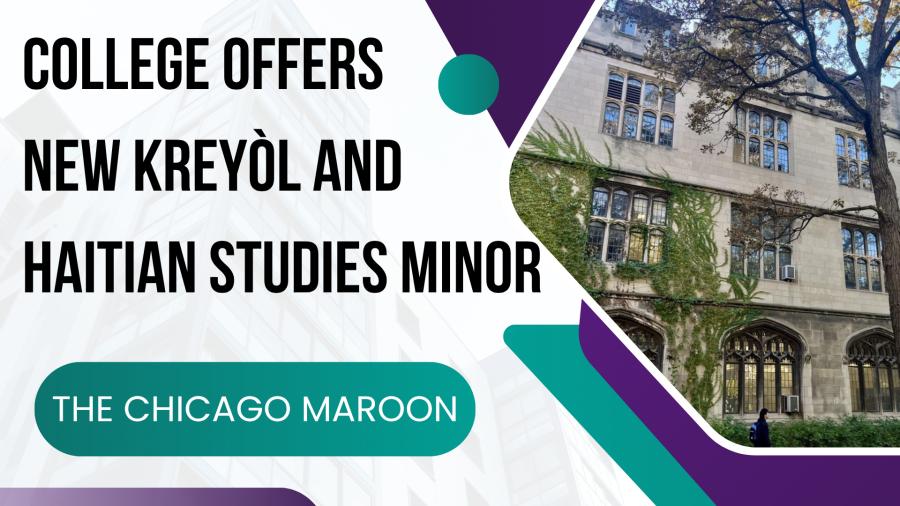The Chicago Maroon's Lark Martin published an article titled "College Offers New Kreyòl and Haitian Studies Minor" on RLL's new minor! Read the full article on the Maroon website, text copied below.
" Beginning this quarter, the College is offering a new minor in Kreyòl and Haitian studies, housed in the Department of Romance Languages and Literatures.
The minor program was developed by assistant instructional professor of French and Haitian Creole Gerdine Ulysse. The minor requirements include two Kreyòl language courses and four other upper-level courses spanning language, culture, and literature concerning francophone Caribbean culture, Haitian culture and society, and creole-speaking communities.
Students will be encouraged to branch across departments and areas of study to fulfill the second requirement, according to Ulysse. “For us, it’s important for the program to be a collaborative initiative, where students can take courses from other departments as well,” Ulysse said. “It’s a way to bring faculty members together, working towards the same goal.”
The minor combines language and sociocultural learning to give students a holistic view of Haitian life. “Language is intertwined with culture,” Ulysse said. “Our role is to give students an overall picture of the Haitian context. It’s not just language, but also other aspects of the society.”
Kreyòl courses were first offered in autumn 2021 when Ulysse arrived at the University as the sole lecturer in Kreyòl and Haitian Studies. But, when she arrived at the University, Ulysse thought the need for a true Kreyòl program was obvious. “When I came, I wanted to create a program, and the school supported it,” Ulysse said.
“I saw that students needed this,” she said. Before the introduction of the minor, students could take six or more Kreyòl courses, but they would only count toward a minor or major in Romance languages and literatures, not as a stand-alone certificate. The process of building the minor program began in autumn 2024, and the minor was approved in February 2025.
A stand-alone program in Kreyòl and Haitian studies is rare within higher education institutions in the United States. Only a few other institutions, such as Duke University and the University of Florida, offer dedicated Haitian Creole programs. Still, most programs are part of a broader Francophone studies program, often without Haitian leadership at the forefront.
“With my background in sociolinguistics and also as a Haitian, I think that I have a personal duty [to create this program]. For me, it is important to see Kreyòl at the same level as every other language,” Ulysse said. “Especially in higher education, we want people to see that we need to go beyond offering a course.”
“This is beyond UChicago,” she continued. “This is something I’m doing for the people of my country.”
Third-year Kreyòl student and President of Kreyòl Club Jessica Pierre emphasized the broader importance of an official program in giving visibility to the Creole language community. “People who speak Creole languages are often underrepresented and underserved,” she said. “Because Creole languages come from a history of colonization, there is a lot of stigma around if they are considered real languages.”
The program aims to provide a comprehensive education in Haitian culture, history and language. “If you are interested in any attribute of the Haitian people—it could be the history or the culture, music, food, regardless of where you came from, your origins, your background—the program is for you,” Ulysse said.
The Kreyòl and Haitian studies program plans to collaborate with the Kreyòl Club, which Ulysse founded as a space for Kreyòl students to practice the language. The Kreyòl Club organizes events like a celebration of Haitian Heritage Month in May and an upcoming Kreyòl Poster Event on November 19. “The Kreyòl Club is a place for students to practice their Haitian Creole and to learn more about Haitian culture,” Pierre said.
Ulysse highlighted opportunities for cultural immersion off campus as well. The program collaborates with the DuSable Heritage Association, coordinating guest speaker presentations for students in the minor. One course, KREY 20400, will take students to Haitian restaurants, the Haitian American Museum of Chicago, and the Haitian Consulate of Chicago. The course is cross-listed with Chicago Studies and the Department of Race, Diaspora, and Indigeneity.
The primary goal for the Kreyòl and Haitian studies program in the coming years is to ensure its long-term viability, Ulysse said. “We want the minor to be more stable, because it is still a new initiative, before we turn to a major.” She added that hiring more faculty and developing more courses will ensure the program can sustain itself. While Ulysse is currently the only professor of Kreyòl and Haitian Studies, the Department of Romance Languages and Literatures is in the process of hiring a part-time lecturer, she said.
As the College’s Division of the Arts & Humanities faces possible restructuring to cut administrative costs, the future of many programs, including Kreyòl and Haitian studies, is uncertain. When asked about the potential impact of these changes, Ulysse said, “I have not heard anything about the program being different in the future. The program is taking things day-by-day.” "

